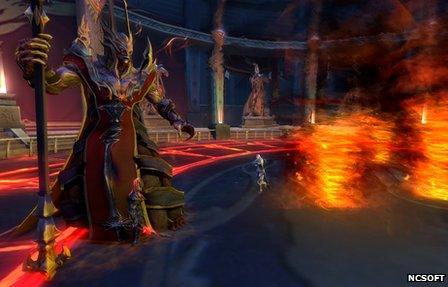Web 're-defining' human identity says chief scientist
- Published
- comments

Online role-playing games help people shrug off preconceptions and find their true identities, says the report
Social networks such as Facebook and on-line gaming are changing people's view of who they are and their place in the world, according to a report for the government's chief scientist., external
The report, published by Prof Sir John Beddington, says that traditional ideas of identity will be less meaningful.
One consequence could be communities becoming less cohesive.
This change could be harnessed to bring positive changes or if ignored could fuel social exclusion, says the study.
"This can be a positive force, exemplified by the solidarity seen in the London 2012 Olympics or a destructive force, for example the 2011 riots," says the report.
"Due to the development of smart phones, social networks and the trend towards (greater) connectivity disparate groups can be more easily mobilised where their interests temporarily coincide."
"For example," it says, "a 'flash mob' can be mobilised between people who have not previously met".
The report, entitled "Future Identities," says that near continuous access to the internet, termed "hyper-connectivity", will drive profound changes to society over the next 10 years.
'Hyper-connectivity'
Prof Beddington commissioned the study as part of the Government Office for Science's Foresight programme - the influential Foresight reports look ahead to highlight emerging trends in science and technology with a view to informing policies across government departments.
"The most dynamic trend (in determining identity) is hyper-connectivity," Prof Beddington told BBC News.
"The collection and use of data by government and the private sector, the balancing of individual rights and liberties against privacy and security and the issue of how to tackle social exclusion, will be affected by these trends," he said. "I hope the evidence in today's report will contribute to the policy making process."
This latest report on identity undertook 20 separate reviews in which leading UK and international experts assessed research in computer science, criminology and social sciences.
It states that the changing nature of identities will have substantial implications for what is meant by communities and by social integration. The study shows that traditional elements that shape a person's identity, such as their religion, ethnicity, job and age are less important than they once were.
Instead, particularly among younger people, their view of themselves is shaped increasingly by on-line interactions of social networks and on online role playing games.
The study found that far from creating superficial or fantasy identities that some critics suggest, in many cases it allowed people to escape the preconceptions of those immediately around them and find their "true" identity. This is especially true of disabled people who told researchers that online gaming enabled them to socialise on an equal footing with others.

Social networks also helped people organise during riots in 2011
"The internet can allow many people to realise their identities more fully, " the authors write. "Some people who have been shy or lonely or feel less attractive discover they can socialise more successfully and express themselves more freely online".
The report points out that in 2011, 60% of internet users were members of a social network site, a huge surge in usage, up 43% from 2007. Consequently, it says that there may greater political activism using these networks as was seen in the revolution in Tunisia and the mobilisation of dissent in Egypt and Libya.
There will also be a blurring of work and social identities as photos and details of people's personal lives become increasingly public on social networking sites. The report cites a hypothetical example of how a young person was denied promotion because her employer found drunken photos of her from her university days.
The report says that as the distinction between online and real world identities diminishes criminals are likely to try and exploit the many new forms of interlinked data relating people's identities and from social media and professional and financial websites in order to steal identities.
Follow Pallab on Twitter, external
- Published7 January 2013
- Published31 December 2012
- Published29 December 2012
- Published21 December 2012